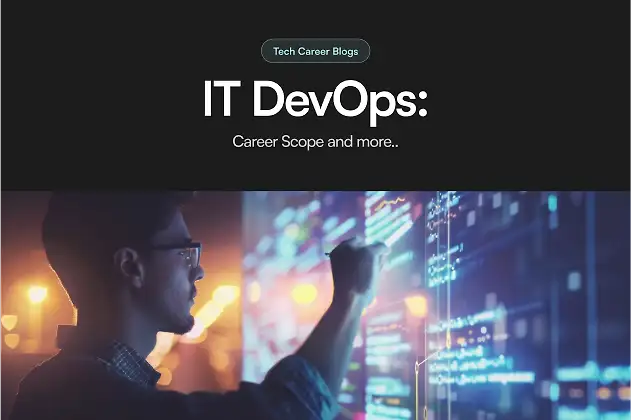
DevOps Career : Salary, Benefits and Courses in Nepal
Published on : October 7, 2023
Unlocking the Potential of a DevOps Career for IT Graduates
In today's tech-driven world, the need for DevOps professionals is going up. But why? It's because the way we use technology is changing. Businesses, no matter their industry, depend more and more on technology. They want to make and deliver software faster and better. They're always in a hurry to come up with new ideas, launch new features, and adapt to what customers want. And this is where DevOps comes into play.
So, as technology keeps changing, the demand for DevOps experts is growing. Companies see how DevOps can help them stay competitive and make their customers happy. That's why if you're an IT graduate looking for a career, specializing in DevOps is a smart choice. You'll be in demand, and your skills will be a valuable asset in today's tech-focused world.
Understanding DevOps: A Holistic Approach to IT
What is DevOps?
DevOps, often described as the amalgamation of "Development" and "Operations," constitutes a comprehensive approach encompassing a spectrum of practices, guiding principles, and cultural philosophies. Its primary objective is to establish and enhance collaboration between two fundamental IT domains: software development (Dev) and IT operations (Ops) teams. At its core, DevOps strives to usher in an era of automation, operational efficiency, and an unwavering commitment to continuous improvement across the entire software development lifecycle.
DevOps is a set of methods that help companies build and deliver software quickly and with fewer mistakes. This is a big advantage because it means companies can respond to what customers want faster. And it helps them stay competitive in the fast-paced business world. DevOps also encourages teams to work together better, which means they can get things done more smoothly and with fewer problems.
Watch our podcast to learn about DevOps:
https://youtu.be/LmoNysrMPCw[/embed]
What DevOps Encompasses: A Multifaceted Discipline
DevOps encompasses a wide array of practices and tools, including but not limited to:
Continuous Integration (CI):
This is like the heartbeat of DevOps. It involves developers frequently combining their code changes into a central repository. It's a bit like having many musicians playing together in harmony. By doing this often, we catch any issues early on, like off-key notes in a song, before they become big problems. This helps in keeping the software development process smooth and efficient.
Continuous Delivery (CD):
Imagine this as a well-oiled machine for releasing software. CD automates the process of getting new features or fixes out to users. It's like a conveyor belt that delivers fresh, error-free software to customers regularly. This means users get to enjoy new things or bug fixes quickly and reliably.
Automation:
Think of this as having a helpful robot do repetitive and boring tasks for you. In DevOps, we use automation to handle tasks like testing, deploying (which is like putting software onto a computer), and managing configurations (like setting up how software works). This makes things faster, reduces mistakes, and frees up people to work on more exciting and creative parts of the job.
Collaboration and Communication:
Picture a team that's really good at playing different musical instruments together in perfect harmony. In DevOps, this is about making sure that the development and operations teams work together smoothly. They talk openly, share ideas, and help each other out. This teamwork breaks down any walls or barriers between them, making the whole process more productive.
Monitoring and Feedback:
Imagine having special sensors in a car that tell you how it's performing and if anything is wrong. DevOps does something similar with software. It uses tools to keep an eye on how software is working and what users think about it. If there are issues, the team gets feedback quickly and can fix things faster.
Infrastructure as Code (IaC):
This is like having a recipe for setting up a kitchen. In DevOps, we treat the setup of the computer systems (the infrastructure) like a recipe. This makes it easier to manage and create copies of those computer environments exactly as we need them. It's a bit like saying, "I want my kitchen to look exactly like this," and then magically making it happen.
Security:
Imagine having a superhero shield that protects you from harm. DevOps integrates security practices at every stage of making software. It's like having that superhero shield around your software to keep it safe from bad guys (in this case, cyber threats). This way, we make sure the software is robust and secure from the start.
These components work together like different instruments in an orchestra, creating a harmonious blend that ensures software is not only built faster but also more reliably and securely.
Getting Started with DevOps: The Essential Steps
Develop a Strong Foundation
For IT graduates looking to venture into DevOps, it's essential to have a strong foundation in IT concepts, including operating systems, networking, and programming languages. Understanding the fundamentals will provide a solid base upon which to build DevOps expertise.
Embrace Automation
Automation is at the heart of DevOps. Learning automation tools and scripting languages like Python, Bash, or PowerShell can significantly enhance your capabilities as a DevOps professional. Automation streamlines repetitive tasks, reduces errors, and accelerates processes.
Learn Version Control
Proficiency in version control systems like Git is crucial. Version control allows teams to collaborate effectively, track changes, and manage code repositories efficiently.
Explore Containerization
Containerization technologies like Docker have revolutionized software development and deployment. Understanding containers and container orchestration platforms like Kubernetes is highly valuable in DevOps.
Familiarize Yourself with Cloud Services
Cloud computing is integral to modern IT operations. Familiarize yourself with cloud platforms like AWS, Azure, or Google Cloud, as DevOps often involves deploying applications to the cloud.
Dive into Configuration Management
Configuration management tools like Ansible, Puppet, or Chef are essential for automating and managing infrastructure. These tools help ensure consistency and reliability in deployments.
Master CI/CD Pipelines
Continuous Integration and Continuous Delivery (CI/CD) pipelines are the backbone of DevOps. Learning tools like Jenkins, Travis CI, or GitLab CI/CD is crucial for automating software delivery processes.
Develop Soft Skills
Effective communication, collaboration, and problem-solving skills are equally important in DevOps. DevOps professionals often work closely with cross-functional teams, making interpersonal skills invaluable.
DevOps Training: The Gateway to Expertise
For IT graduates looking to accelerate their journey into DevOps, specialized training programs can provide the knowledge and skills needed to excel in this field. DevOps training, such as the offerings at Trainingpoint, equips individuals with practical insights, hands-on experience, and industry-relevant expertise. These programs cover essential DevOps practices, tools, and methodologies, ensuring that graduates are well-prepared for the demands of the role.
Why Choose a DevOps Career: Benefits, Salary & Opportunities
High Demand
DevOps professionals are in high demand worldwide. According to the DevOps Institute's 2020 Upskilling report, 83% of respondents reported difficulty finding qualified DevOps talent. This high demand translates into excellent career prospects for IT graduates. According to the DevOps Institute's 2020 Upskilling report, 58% of organizations reported that they had implemented DevOps practices.
Competitive DevOps Salary
DevOps roles often come with competitive salaries. In the United States, for example, DevOps engineers can earn an average annual salary ranging from $90,000 to $150,000, depending on experience and location. In fact, according to Payscale DevOps professionals are among the highest-paid in the IT industry, with an average annual salary of $103,419.
Continuous Learning
DevOps is a dynamic field that encourages continuous learning and innovation. IT graduates can stay engaged and challenged by keeping up with the latest technologies as well as best practices.
Job Satisfaction
DevOps professionals often find their work highly rewarding. They play a crucial role in delivering value to organizations by improving efficiency, reducing errors, and accelerating software delivery. According to GVR (Grand View Research) The global DevOps market size is expected to expand to USD 37.25 billion by 2030, and increase with 16.8% CAGR from 2023 to 2030.
Versatile Skill Set
DevOps professionals develop a versatile skill set that includes automation, cloud computing, security, and collaboration. These skills are transferable across various IT roles.A study conducted by DORA (DevOps Research and Assessment) revealed that the best DevOps teams deploy code a whopping 208 times more often, get code from development to deployment 106 times faster, and experience failures in their changes only 1/7th as often compared to less effective teams.
Embarking on a DevOps Journey
For IT graduates, a career in DevOps offers an exciting and rewarding path. With its emphasis on automation, collaboration, as well as continuous improvement, DevOps aligns perfectly with the evolving IT landscape. By developing a strong foundation, embracing automation, and exploring key DevOps practices and tools, graduates can position themselves for success in this dynamic field.
DevOps training, such as the programs offered by Trainingpoint, serves as a valuable stepping stone, providing the knowledge and skills needed to excel in DevOps roles. As the demand for DevOps professionals continues to grow, IT graduates have the opportunity to embark on a journey filled with challenges, learning, and impactful contributions to the world of technology. So, if you're an IT graduate looking for a career path that offers both professional growth and personal satisfaction, consider the exciting world of DevOps. It's a journey that promises continuous learning, competitive rewards, and a chance to shape the future of IT operations and software development.
Join Our DevOps Training
Related posts
0
/ 0
0
/ 0







